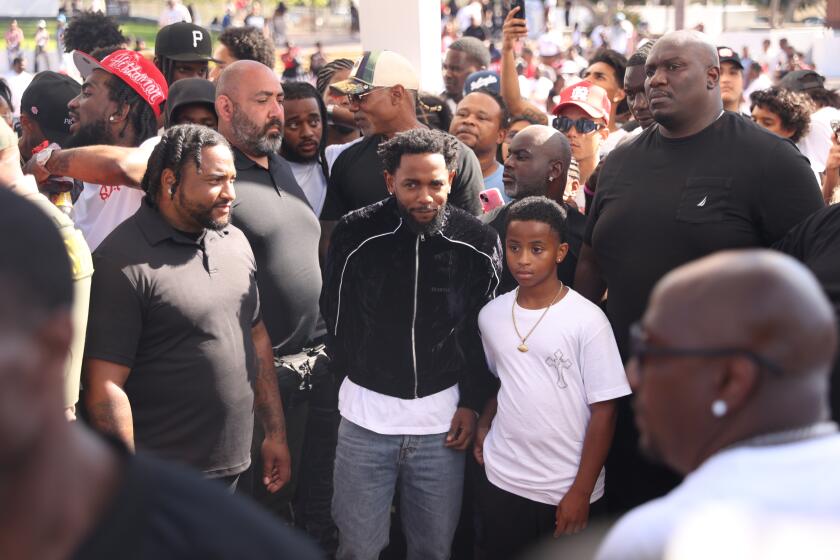Court Voids Guilty Verdict
A man found guilty nine years ago of slaying an Oxnard mother of four has had his conviction overturned by a federal court because he wasn’t advised of his Miranda rights.
The U.S. 9th Circuit Court of Appeals also noted that Ventura County Sheriff’s Sgt. Michael Barnes, who spoke with the murder suspect in this case, often failed to advise suspects of their rights.
“Apparently, Barnes routinely declined to read Miranda warnings
The opinion involves the case of Frederick Lee Jackson, who was convicted in 1995 of raping and murdering Genoveva Gonzales, 30.
The court’s ruling pleased defense attorneys but raised concerns about other cases Barnes worked on.
“The law is well-established and it’s pretty clear that what he did wasn’t acceptable,” Assistant Public Defender Duane Dammeyer said in an interview Thursday.
Dammeyer said he would contact several deputy public defenders to determine if there were other serious felony cases involving Barnes that needed to be reviewed.
So far, conversations with two attorneys in his office have turned up no other Miranda problems, Dammeyer said. But, he added, Barnes worked on dozens of cases and the investigation could take some time.
“Law enforcement people tend to push the limits,” he said. “That’s obviously a concern of ours.”
Barnes, who left the Sheriff’s Department after Jackson’s trial to become a district attorney’s investigator, retired this week after 34 years with the county.
Chief Deputy Dist. Atty. Patricia Murphy said she was disappointed with the ruling and that Barnes’ comments, which were included in court motions, had been misinterpreted.
“Mike Barnes was a top-notch investigator, one of the best we had in Ventura County, and any inference that he had done something illegal, immoral or unfair is just flat wrong,” Murphy said.
She said that law enforcement officers were not required to administer Miranda rights unless a person was being interrogated in a “custodial setting.”
In Jackson’s case, Murphy said that Barnes met with him in 1993 while Jackson was incarcerated on unrelated charges and that Jackson had volunteered incriminating information.
“Our feeling was that it wasn’t an interrogation -- that it hadn’t progressed to the questioning part -- and it was just a statement made almost in passing as the detective was leaving the room,” Murphy said.
According to the opinion, Barnes interviewed Jackson in prison three separate times and issued Miranda warnings during the first two meetings.
During the third encounter, Barnes asked Jackson six times if he would talk about the case but Jackson refused. On his seventh try, Jackson replied, “Yeah, well, you know, I didn’t do this. You know I didn’t, I didn’t do that. You know I just happened to be there,” according to the court’s ruling.
Deputy Atty. Gen. Scott A. Taryle, who argued the case before the federal court, said Thursday that his office must decide by April 9 whether to appeal the decision to the 9th Circuit’s full 11-judge panel.
“I am disappointed in the result because I strongly believe that if any Miranda violation did occur, it was absolutely harmless,” Taryle said. “I believe the evidence was strong enough to convict him of the murder even without his statement.”
Taryle’s sentiments were echoed in the court’s dissenting opinion written by Judge Diarmuid F. O’Scannlain.
Jackson, now 35, will remain incarcerated at Centinela State Prison in Imperial to serve time for Gonzales’ rape. A decision to retry him for murder was pending until Taryle’s next move.
According to trial testimony, Jackson and Christopher Sattiewhite kidnapped Gonzales on Jan. 26, 1992. Jackson raped her in the back seat of a car, shoved her out and then ordered Sattiewhite to kill her.
Gonzales’ body was found a day later in a drainage ditch in Oxnard. She had been shot three times in the head.
Investigators linked Jackson, Sattiewhite and a third man to the killing months later while investigating another case.
In exchange for a lighter sentence for the beach rape, a third suspect -- Bobby A. Rollins of Long Beach -- told police he drove up as Gonzales was being shot. Rollins was not charged in the slaying.
In 1994, Sattiewhite was convicted and sentenced to death. A year later, Jackson was convicted and given life in prison without the possibility of parole. Rollins got a 20-year term for the beach rape.
Jackson’s lawyers appealed on a number of issues, but the appellate justices agreed to overturn his conviction only on the Miranda issue.
According to the opinion, the jury in Jackson’s case heard a taped interview of that third critical meeting between Barnes and Jackson. The federal justices viewed Jackson’s admission as a critical piece of evidence because of the possibility that jurors could have viewed Rollins’ testimony as unreliable because of the deal he made with prosecutors.
“We conclude that admission of Jackson’s inculpatory statement provided an inordinate boost to Rollins’ otherwise minimal credibility in jurors’ minds,” according to the court’s majority.
More to Read
Sign up for Essential California
The most important California stories and recommendations in your inbox every morning.
You may occasionally receive promotional content from the Los Angeles Times.










